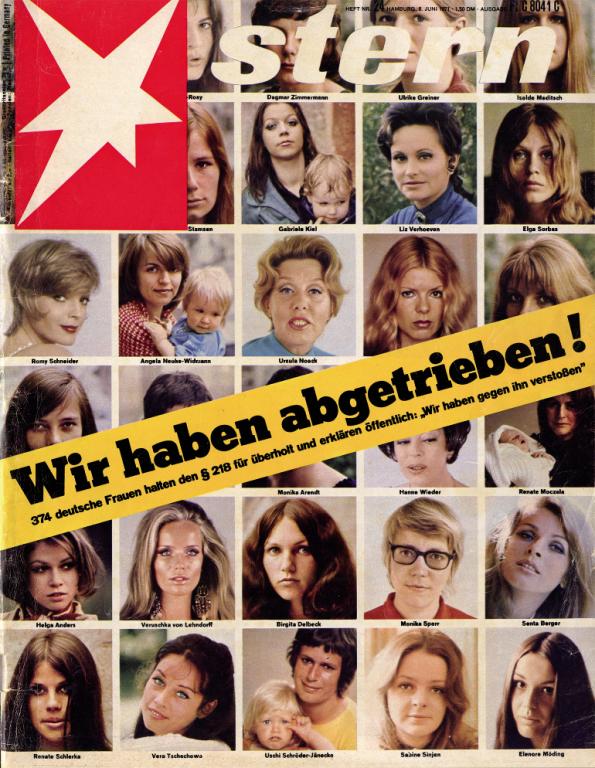
Hossam el-Hamalawy via Flickr
“We’ve had abortions!”

Yanara Schmacks
CUNY Graduate Center
Yanara Schmacks is a PhD candidate in Modern European History at the CUNY Graduate Center in New York. Her research was published in Central European History and in Psychoanalysis and History. She is working on a dissertation project that explores the politics of motherhood in the three German states from the 1970s to the early 2000s.
Abortion in Germany since the Stern Self-Incrimination Campaign 50 Years Ago
In March 2020, the UN Officer for Human Rights in Geneva sent a critical letter to the German Ambassador to the UN, reprimanding the German government for failing to implement the international women’s rights convention CEDAW. The letter criticized that the conditions around the century-old §218, the paragraph in the German Criminal Code that regulates abortions, have not been improved and continue to curtail women’s reproductive choice. Indeed, rather than improving, abortion access in Germany today is increasingly under threat for two major reasons. First, anti-abortionists have made it their “hobby” to vilify and/or sue doctors who perform or even merely inform about abortions. Most recently, the case of the Giessen-based doctor Kristina Hänel has made nationwide headlines, as she was sued and convicted for putting medical information about the termination of pregnancies that her practice offered on her website, something that counts as “advertising for the termination of pregnancy” under §219a and is therefore illegal. Her case is currently being moved to the German Constitutional Court.[1] Second, with many of those doctors who do offer abortions retiring and medical study failing to provide the necessary medical training for the termination of pregnancies, the number of doctors performing abortions is significantly decreasing. In response to this trend, groups like the Medical Students for Choice in Berlin are organizing voluntary workshops in which aspiring doctors practice abortions on papayas, and reproductive rights advocates like pro familia are forced to rely on the cooperation with doctors from the Netherlands to ensure access to abortion in certain areas of Germany.
Calling to mind how West German women in the 1970s often had to travel to the more liberal Netherlands to get an abortion, this development seems like an anachronism. Considering the century-old fight for abortion rights, how did we arrive at the present predicament?

Precisely 50 years ago, 374 women sent shockwaves through the Federal Republic when they declared “We’ve had abortions!” on the now-iconic Stern cover from June 6, 1971. Inspired by the French self-incrimination campaign “Manifesto of the 343 (sluts)” and headed by the feminist figurehead Alice Schwarzer, the women involved in this risky move (they could have been convicted for up to five years in prison for admitting to having had an abortion) exposed the health risks that women undergoing illegal abortions were facing and demanded the striking of §218, the right to abortion for all women, the cost coverage of abortions by health insurance, and free access to contraceptives. The self-incrimination campaign provided the impetus for the country-wide “Action 218” and mobilized a wide range of supporters. Yet, while undeniably brave and crucial, that very activism was not without its problems, some of which continue to contribute to the current impasse, as the arguments that activists raised in favor of the pill and abortion access were sometimes drawing on eugenic reasoning to make their case.[2]
“Action 218” achieved an initial success when the Bundestag legalized abortion within the first trimester in 1974. This reform was, however, quickly overturned by the Federal Constitutional Court, eventually resulting in the 1976 compromise law that confirmed general culpability but allowed for exemption from punishment upon four indications (medical, criminological, embryopathic, and social). Conspicuously, in the same moment in which the Federal Constitutional Court built its restrictive verdict on an argument around the human dignity of the fetus, concerns about “overpopulation” in the global South persisted and worries about the “baby-boom of guest workers” within West Germany emerged, lacking any unease about the fate of “developing life” among foreigners and instead pushing for its prevention.
A look to the East reveals a much more liberal reproductive regime in the pro-natalist GDR from the early 1970s onward. Here, abortion within the first trimester was legalized in 1972, with full cost coverage and no mandatory counseling – a “for that time (and even today) modern regulation outside of criminal law.”[3] The state’s motivation to liberalize abortion access remains contested, with explanations ranging from a focus on the genuine belief in the core socialist value of (gender) equality, to an emphasis on Cold War system competition with the West, to the claim that this was the GDR’s way to encourage women to bear more children, to the assertion that the GDR needed women to be more available for production rather than reproduction. In contrast to West Germany, abortion reform in the GDR was not pushed for from below by a social movement and the reform was not widely debated in public until the 1980s when selected women authors began to critically discuss the remaining hurdles women seeking an abortion were facing.
When the wall came down in 1989 and the two Germanies embarked on unification negotiations, abortion emerged as one of the, if not the, most contested topics of the unification process, threatening to founder the unification treaty.[4] After the Federal Constitutional Court again intervened in 1993 and prevented a liberalizing reform from going into effect, the 1995 law that the German Bundestag agreed on virtually imposed the West German §218 on the unified republic,[5] taking away essential reproductive rights from GDR-born women and reinforcing the impression that Eastern Germany was victim to a “Kohlonization.” As the member of parliament Anke Domscheit-Berg (Die Linke) stated in this context in 2019: “We [East German women] feel cast back to the Stone Age.”
50 years after the Stern self-incrimination campaign vocally fought for sexual and reproductive self-determination, the German state continues to criminalize women who act upon the popular feminist slogan “my body, my choice.”
The Federal Constitutional Court has played a peculiar role in German abortion legislation, not only due to its stultifying impact on efforts to improve abortion access but also because of the rhetoric it employed in its verdicts. Scholars like Barabara Duden have noticed a shift in the referential category worthy of protection in the 1993 ruling, as it changed from a concrete understanding of the “human” (Mensch) to the abstract notion of “life” (Leben).[6] This contributed to a specific moral nexus and rhetoric around “life,” which peaked in the 2002-2006 feuilleton craze about declining birthrates of (white) German (academic) women that aimed at restricting abortion access even further. The conservative newspaper Welt, for example, titled in 2006 “The Failure of a Generation before Life” and argued that “Not only do we dislike begetting children, we also like aborting them. (…). Had we brought the aborted children into the world, the population would not have shrunken.” In the wake of this demographic debate, abortion cost coverage for people in need came under attack, as the social minister of Saxony proposed to instead use the money to help unintentionally childfree couples pay for new reproductive technologies.[7] And in 2009, coated in the language of disability rights, the law was changed to subject abortion-seeking women carrying fetuses with disability (which can be aborted under the medical indication even after the first trimester) to a new three-day waiting period before terminating the pregnancy. In addition, the reform introduced heightened risks of fines and prosecution for counseling doctors, making many hesitant to help those who are facing an already incredibly difficult situation.[8]
The current predicament in which abortion access is increasingly curtailed and §218 and §219 threaten to ruin doctors who offer and inform about the termination of pregnancies must thus be understood against the background of the moral-political debates of the last decades. In these debates, as Daphne Hahn has argued, the boundary between that which is being discussed and that “which is really tabooed lies right where self-determination regarding the termination of pregnancy and women’s free choice is concerned.”[9] 50 years after the Stern self-incrimination campaign vocally fought for sexual and reproductive self-determination, the German state continues to criminalize women who act upon the popular feminist slogan “my body, my choice.”
[1] In response the Hänel’s case and others, the German Bundestag has agreed on a compromise reform of §219a in 2019, now allowing doctors to mention that they perform abortions on their websites but continuing to prohibit any information on the methods for termination that their doctor’s office provides.
[2] See Dagmar Herzog, Unlearning Eugenics: Sexuality, Reproduction, and Disability in Post-Nazi Europe. Madison, Wisconsin: The University of Wisconsin Press, 2018.
[3] Busch, Ulrike. “Vom individuellen und gesellschaftlichen Umgang mit dem Thema Abtreibung“. In Abtreibung: Diskurse und Tendenzen, edited by Ulrike Busch and Daphne Hahn, Bielefeld: Transcript, 2015, 24.
[4] Busch, Ulrike. „Schwangerschaftsabbruch in Ost und West: Die Perspektive der neuen Bundesländer“. pro familia magazin, No. 01/2007 (2007): 10–12.
[5] Under the 1995 law abortion remained regulated within the Criminal Code. In addition to allowing for the termination of pregnancies on indication, it now also provided for the possibility of aborting a fetus within the first trimester after mandatory counseling and a three-day waiting period, which is illegal but exempt from punishment.
[6] Duden, Barbara. Der Frauenleib als öffentlicher Ort: vom Mißbrauch des Begriffs Leben. 2. Aufl. Munich: dtv, 1994.
[7] Franz, Jutta. “Kostenübernahme bei Schwangerschaftsabbrüchen“. pro familia magazin, No. 01/2007 (2007): 24–25.
[8] Herzog, Dagmar. “Post coitum triste est…? Sexual Politics and Cultures in Postunification Germany“. German Politics and Society 28, Nr. 1 (2010): 111–40.
[9] Hahn, Daphne. “Diskurse zum Schwangerschaftsabbruch nach 1945“. In Abtreibung: Diskurse und Tendenzen, 58.








